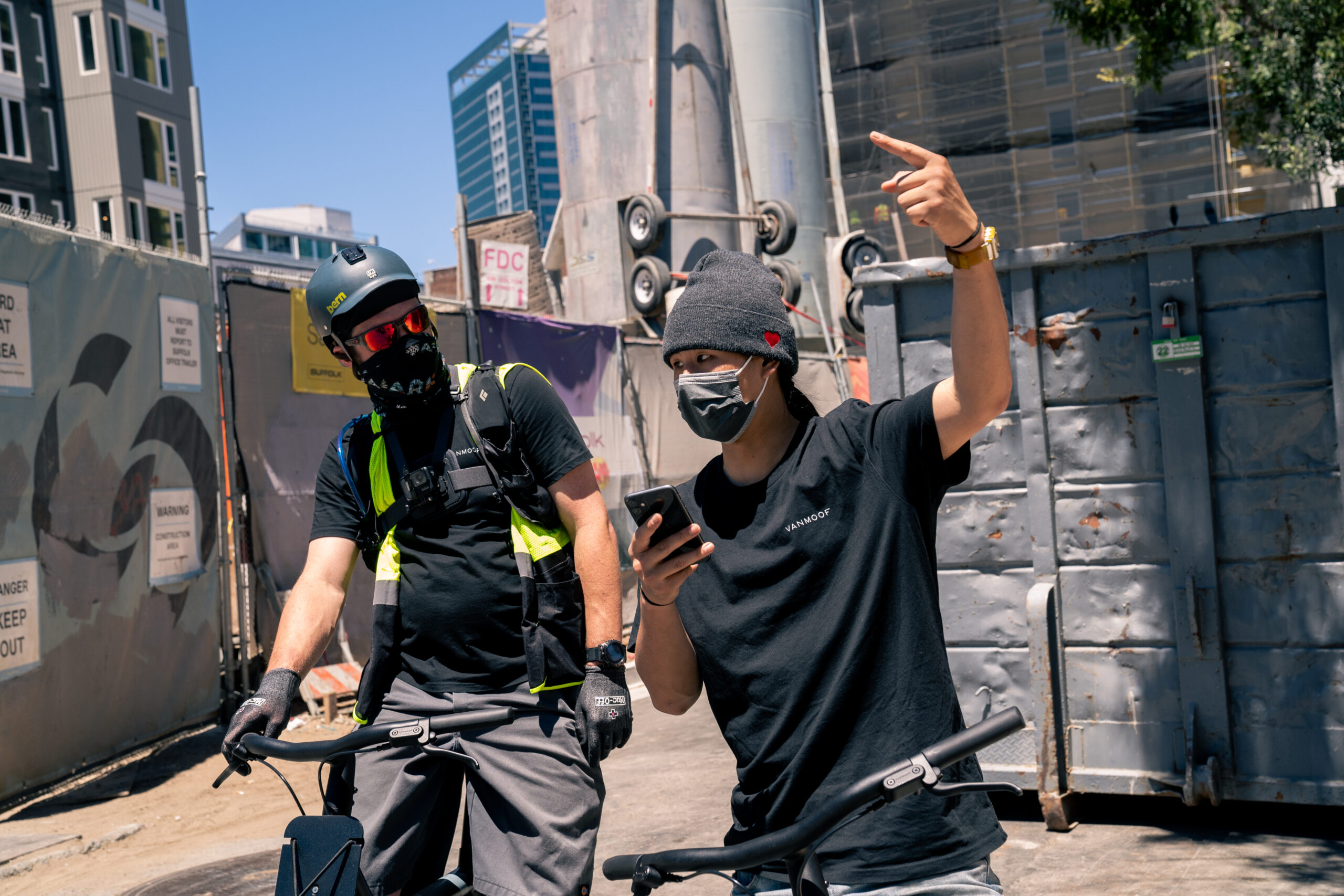When Ryan Eastman was growing up in Petaluma, transfixed by the Tour de France on television, he never dreamed that his love of bicycles would lead him to a career partly spent scrounging for stolen two-wheelers in less-than-savory locales across San Francisco.
But after a bad crash brought an end to his professional cycling career, it wasn’t long before Eastman found himself working for VanMoof, an electric bike company with a storefront on Valencia Street in the Mission District, where part of his job is hunting for stolen bikes.
His misadventures riding into the nooks and crannies of the city have afforded Eastman an unusual vantage point into property crime in the city.
“I think a lot of people that steal these bikes end up flipping them on the street for a couple hundred bucks or for other probably illegal items,” Eastman said. “Their excuse is always the same: ‘My buddy sold me this bike.’”
VanMoof, a start-up from the Netherlands, is taking a crack at a problem that has baffled city leaders for years: How to track and return stolen goods.
The job of a Bike Hunter, the official title the company confers on some of its workers, is to track down stolen bikes using a tracking system discreetly installed into every VanMoof frame. The company offers an insurance plan, dubbed “Peace of Mind,” which guarantees its customers three years of bike recovery or replacement for a one-time payment of $398. “Our ruthless Bike Hunters will track stolen bikes all the way to Casablanca,” the company’s website promises.
Despite the seeming improbability of finding a bike in a city with as many alleys and side streets as San Francisco, VanMoof claims that their success rate is above 70%, according to a spokesperson. The company declined to provide data documenting the recoveries so The Standard was unable to verify that number.
The San Francisco Police Department, meanwhile, has recovered less than 5% of stolen bicycles over the last five years, according to city data. SFPD says several thousands of bikes are stolen annually, at a cost of more than several million dollars. In response to inquiries about their efforts to recover stolen bikes, SFPD pointed to the SAFE Bikes program, which allows people to register their bikes with the police department before they’re stolen.
The city’s lack of success in recovering stolen bicycles isn’t exactly for lack of trying.
After much debate back in 2017, city officials passed legislation allowing the Department of Public Works to confiscate bicycles and bike parts that are blocking sidewalks, with the aim of curbing “chop shops” trafficking in such goods. But the program has failed to show results, with no increase in the number of resolved bike theft cases.
Most recently, Mayor London Breed introduced “exclusion zones” in December, which focused mainly on prohibiting “fencers” from operating in U.N. Plaza by prohibiting public access to a thoroughfare from Market Street to McAllister Street, where people previously sold goods, including stolen bikes. But those efforts have largely led unpermitted vendors to move to another neighborhood, or for some, just down the block.
So what’s the secret to VanMoof’s seeming success with repatriating bikes to their owners?
Aside from having high-tech security software installed on each bike and integrated location tracking technology, Eastman says simply asking for a bike back once it’s been located often does the trick.
“Most of the time they’re usually just pretty shocked we showed up and actually found the bike,” Eastman said. “It’s fairly amicable.”
The Standard accompanied VanMoof employees Adrien Yeung and Bret Carmody on a “hunt” in early July, about 40 minutes into which the two happened to see someone riding one of the company’s bikes. The two-person team did a quick U-turn and pulled aside the person to find that the bike’s GPS system was disabled, indicating that it had been stolen.
The man riding the bike gave it back without a fuss, claiming that he had bought it at a local street market. Yeung said that the team was increasingly suspicious that more organized thieves had caught on to their security system because they continually find that the bikes they recover have been tampered with.
VanMoof is not alone in taking the vigilante approach to bike retrieval. Rae Müller, a bike messenger that rides over 50 miles a day, said they have recovered several bikes by finding them almost by chance and then asking for them back.
“If you’re like ‘yo that bike’s stolen’ then people will generally hand it over,” Müller said.
While part of VanMoof’s high retrieval rate is due to the pinpoint accuracy of their radar systems as well as the firm resolve of its workers, the job is made easier since the thieves are usually hiding in plain sight.
“When we can’t find them it’s usually because they’re inside somewhere…It’s difficult to get a search warrant,” Eastman said, explaining that many of the bikes retrieved by the company locally have been found outside. “Sometimes we’ll look at the map and the bike will be in the Tenderloin, and then the next day we look at it and it’s out in Modesto.”
Part of what drives Eastman and his colleagues to venture into the depths of the city is their knowledge of the pain that losing a bike can inflict.
“It’s pretty heartbreaking because for a lot of people it’s their only way they get around the city,” Eastman said. “As many beautiful things as this city has to offer in terms of cycling, it also has its dark side.”
